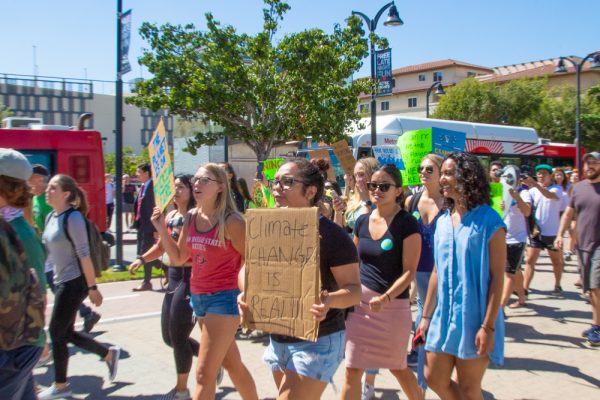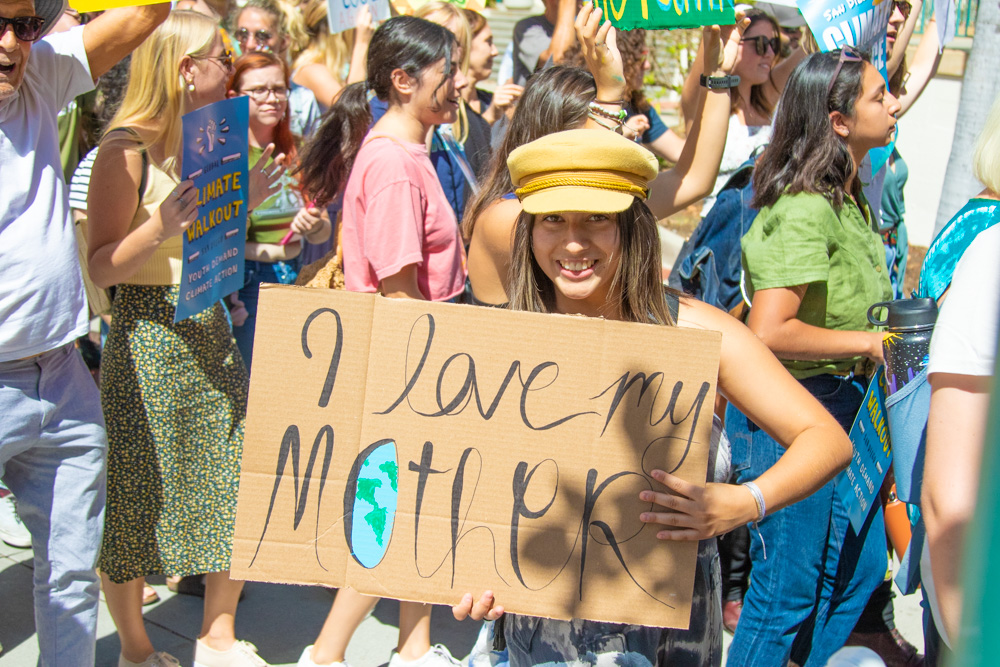USU students across the country participate in global climate strike
On Friday, Utah State University students joined people around the world to rally against climate change and promote clean energy.
“There is no time to wait on this issue. We need to be holding elected officials accountable for developing and implementing solutions towards the climate crisis,” Rachel Chamberlain said, one of the organizers of the strike and the USU S.J. and Jessie E. Quinney College of Natural Resources academic senator.
In conjunction with other students worldwide, students began gathering outside USU’s Old Main building at 11:30 a.m., beginning a strike in the hopes of influencing local and world leaders to take action.
“Some people say that a climate strike is too radical or too intense to happen right now, but I’m not here to give anyone hope right now. I’m here to make you panic,” Chamberlain said.
A group of student leaders from USU attended the San Diego State University rally, while on campus for a USU football game.

Stemming from a series of strikes organized by Swedish teenager Greta Thunberg, the movement has grown rapidly across the globe, including in Logan, Utah. Maria Catalano, another organizer of the strike, said about two million people worldwide participated in the worldwide strike on Sept. 20, and despite the rainy weather in Logan, USU students have become part of that movement.
“The rain is not the best, but people came out, so I don’t mind,” Catalano said. “I’m just really happy that people showed up for what they believe in today and showed that this is what they value.”
A large crowd of students gathered as Chamberlain, Catalano and others shared speeches on climate change.
“We aren’t here today to argue whether or not climate change is real, or really convince anyone if it’s human-caused or not,” Catalano said. “We’re here today to show that many of us are already in support and are ready to take action on this crisis.”
Catalano also outlined the goals of the USU strike. She said, “We’re here to ask that Utah State University, Logan City, the state of Utah and the country switch to clean energy, raise energy efficiency standards, support the Green New Deal, implement a carbon tax and make the other robust systemic changes, so that we can insure a healthy future for all generations.”
Chamberlain also urged students participating in the strike to sign petitions on climate change initiatives and to make signs to let their opinions be heard. Chamberlain also announced a group of students would be marching down to the Logan courthouse beginning at 3 p.m. that same day, continuing the strike in front of the courthouse.
Herm Olsen, a Logan MunicipalCouncil member, also attended the climate strike. According to Olsen, students and others gathered at the strike should stand up for what they believe in.
“If you don’t, [city and state leaders] won’t know that you care,” Olsen said. “These guys will listen when you yell loud enough.”
Catalano said not everyone at USU was thrilled with the prospect of a climate strike on campus.
“People definitely think that calling it a strike was too harsh or would deter people from coming,” Catalano said. “We wanted to stay with the national movement and show that this is serious, and we’re not messing around.”
Despite Chamberlain saying the purpose of the strike was to cause panic, some students also saw hope in the demonstration. Audrey Lidgard, a student at the strike, said, “Utah is not doing enough for climate change. We feel helpless, so things like this raise our hope.”
Other students also expressed enthusiasm for the strike. Tim Woodruff, another student at the strike, said students should take the chances they are given to combat climate change.
“This is one of the few opportunities that we have for direct action in climate change, so you’ve got to get involved,” Woodruff said.
Will Munger also addressed the crowd. Will said he has been fighting climate change his whole life, and despite experiencing pushback from the local government and from other institutions, he is confident change is on the way.
“Today is the beginning. Today we have the opportunity to come together and say, ‘This much further and no farther,’” Munger said. “From here on out, we’re going to take action not just today but every day.”
jshwilki@gmail.com

